
Most of us have experienced some degree of stress and anxiety in recent years due to the Covid-19 pandemic. And with the UK now facing a cost of living crisis, there is plenty to feel anxious about. Stress is a natural thing to experience and can even help to focus our minds and make us more productive. But uncontrolled stress and anxiety can have a debilitating effect on the body. Here, Real Foods takes a look at why healthy eating can be good for mental health.
According to the Mental Health Foundation, these are some of the most common reasons why people experience stress:
- Bereavement
- Divorce
- Separation
- Losing a job
- Unexpected money problems
- Work-related stress

When we feel stressed and anxious, the nervous system alerts our bodies to release stress hormones. These include adrenaline, noradrenaline and cortisol. As a result, these stress hormones produce physiological changes designed to help us cope with the perceived threat or danger. This is known as the “fight-or-flight” response. When we are in fight-or-flight mode, we experience things like an increased heart rate, rapid breathing, tense muscles and trembling.
All this helps to prime the body for action, and to cope under pressure. However, problems arise when we experience continual stress as the body doesn’t have a chance to rebalance and reset. According to the Mayo Clinic, uncontrolled stress can lead to a number of health problems. These range from high blood pressure and heart disease to obesity and diabetes.
Natural nourishment and good mental health
A healthy, balanced diet goes hand in hand with good mental health. Eating well and nourishing our bodies can really help to support us through times of stress and anxiety.
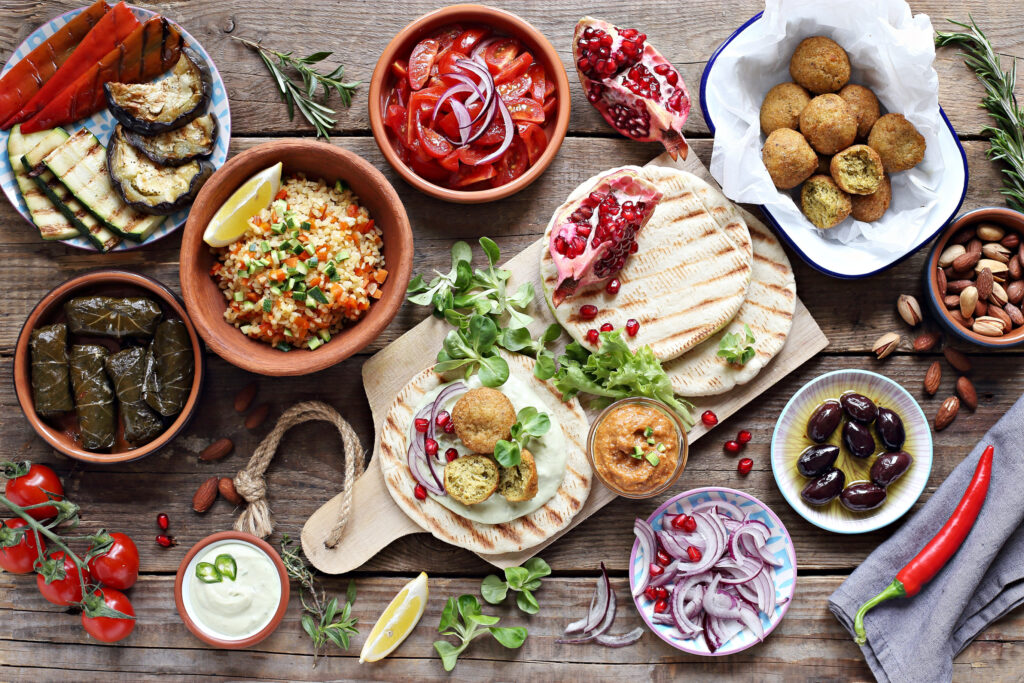
A lot has been written about the health benefits of the Mediterranean diet, particularly in relation to heart health and longevity. But, research also shows that the Mediterranean diet can benefit our mental health. The diet is high in fruit and vegetables, whole grains, legumes, nuts, fish and olive oil. It usually includes a low intake of meat and dairy. The diet is low in saturated fats and animal proteins but high in antioxidants, fibre and monounsaturated fats. It also features a good balance of omega-3 to omega-6 fatty acids.
Blood sugar: a balancing act
Balancing the body’s blood sugar levels is an important factor in keeping stress and anxiety in check. When our blood sugar levels become too low this can lead to symptoms similar to anxiety, for example shakiness, a rapid heart rate and dizziness. It can also make existing anxiety worse. In order to balance your blood sugar levels, aim to eat little and often, aiming for three meals and two snacks per day. Also try to eat some protein with every meal, such as beans, lentils, nuts, seeds, tofu and eggs.
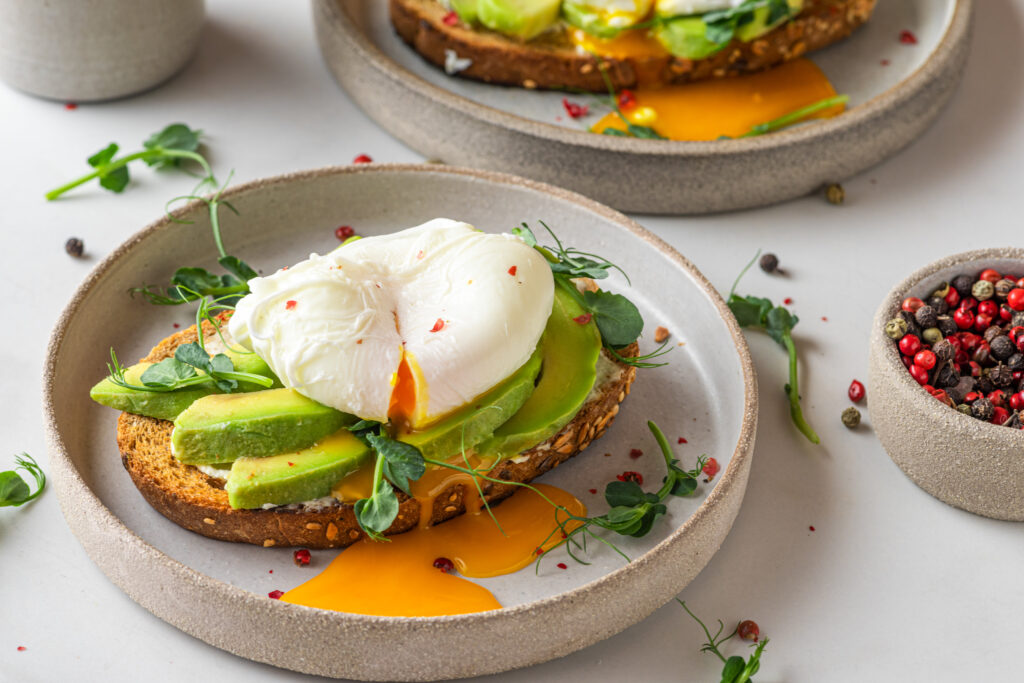
Make sure you start each day with a healthy breakfast so that your blood sugar is on an even keel. A great option is oats and chia seeds soaked overnight in nut milk topped with berries and seeds. Poached eggs with avocado on teff bread is another good way to start your day.
Some things to avoid if you suffer with stress and anxiety are refined and sugary foods as well as caffeine. At first these will cause a rapid rise in blood sugar levels, quickly followed by a crash. Swap refined (white) carbs for brown, wholegrain alternatives such as brown rice, pasta and wholemeal bread. Look for natural sugar alternatives and try switching from caffeinated drinks to herbal teas. Chamomile is particularly calming. Another thing to avoid is excess alcohol. Alcohol changes the brain’s levels of serotonin and other neurotransmitters which can make anxiety much worse.
Why not try keeping a food and drink diary where you monitor everything you eat and drink to see how it might affect your moods?
The mental health benefits of plant-based diets
Research has shown that following a plant-based diet can help with good mental health in various ways. One study showed that a plant-based diet may be protective against depressive symptoms in vegans and vegetarians. Another showed that vegans experience less stress and anxiety than meat-eaters. Here are some suggestions for foods to add to your plant-based diet for good mental health.
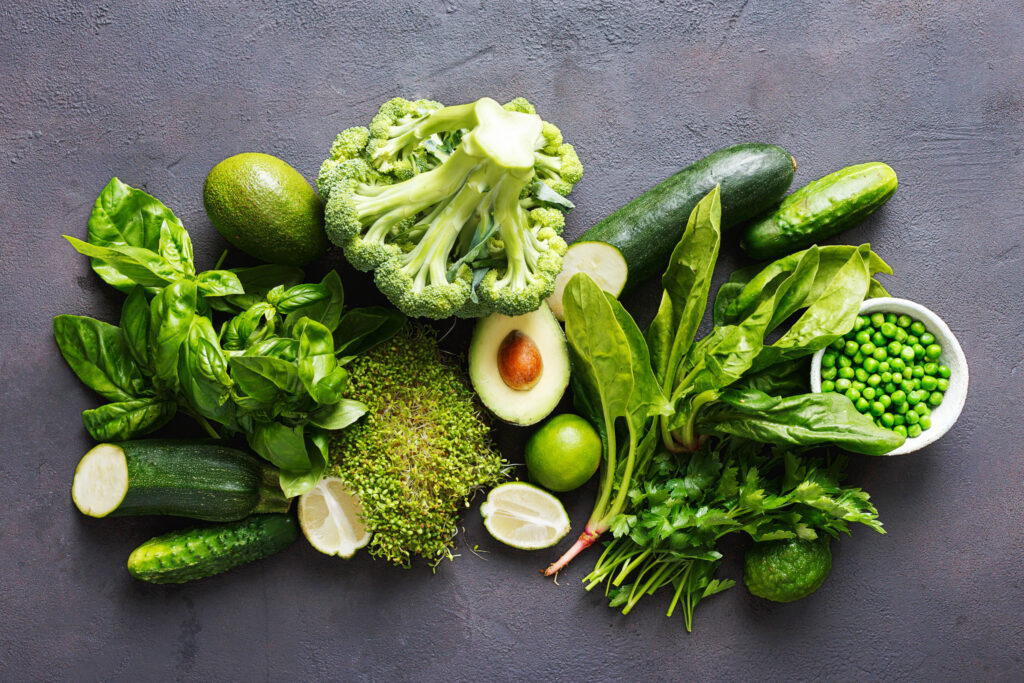
Leafy greens
Green, leafy vegetables such as spinach, kale and collard greens are rich in magnesium. This essential mineral is required for many important functions in the body and has been shown to help with depression and anxiety. Research has also shown that eating more leafy greens can help to slow cognitive decline. The particular nutrient in these vegetables that is responsible for this effect is vitamin K. If you’re not keen on greens, you could add them to a smoothie for an easy way to get your daily intake. Or, try roasting kale in the oven with some paprika for a delicious and healthy snack.
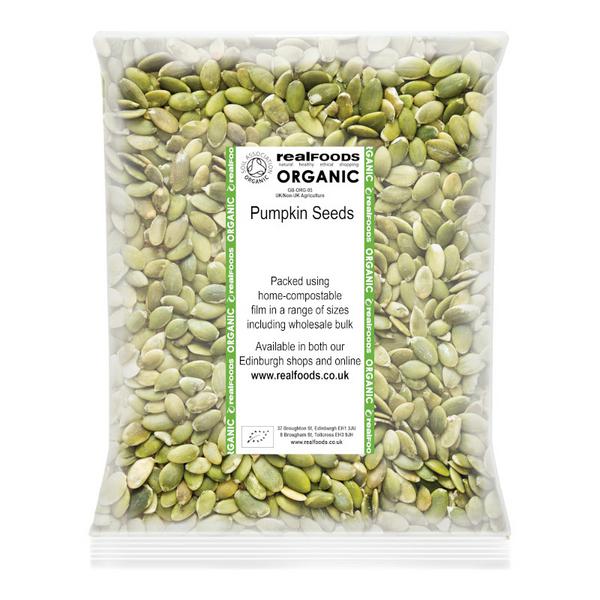
Pumpkin seeds
Pumpkin seeds are a good source of the mineral zinc, which is essential for brain and nerve development. A 2021 study showed that using zinc supplements significantly reduced signs and symptoms of anxiety and depression in elderly people. Pumpkin seeds are also rich in potassium which may help to support low mood. Sprinkle them over your porridge in the morning for a healthy start to the day.
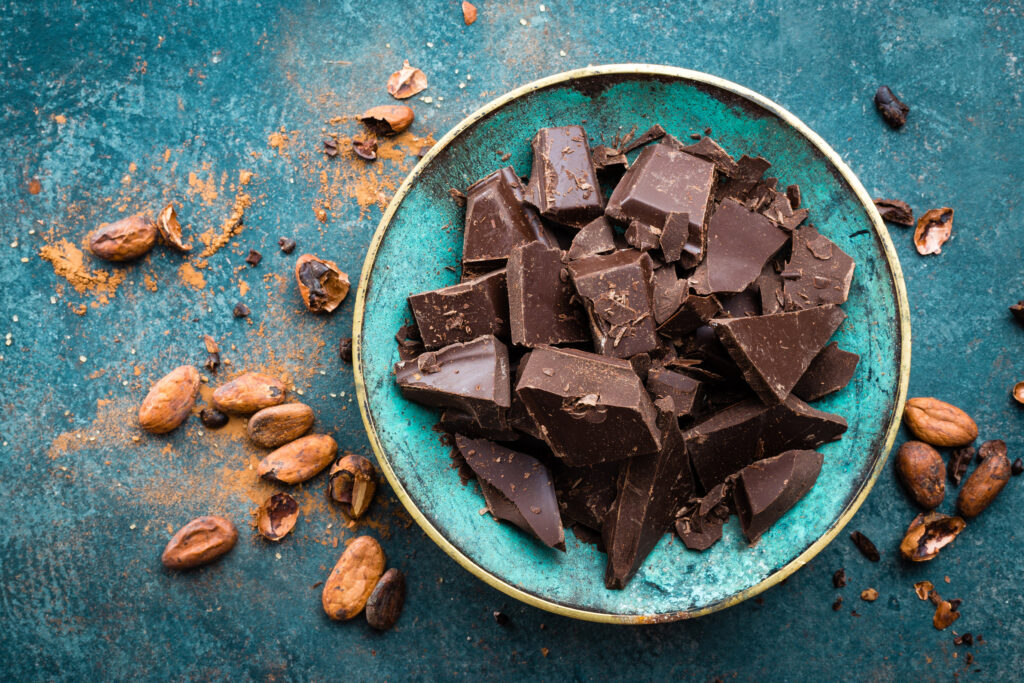
Dark chocolate
Good news for chocolate fans – dark chocolate is a superfood that may help to support good mental health. Dark chocolate contains significant amounts of polyphenols, which are antioxidant compounds that have been shown to help reduce stress. Other studies have demonstrated that dark chocolate or cocoa may help to improve mood. Not only is it a good source of magnesium, but it is also rich in tryptophan, an amino acid that helps to produce serotonin. Serotonin has long been dubbed the feelgood hormone for its ability to regulate mood. When choosing dark chocolate, look for varieties with a cocoa content of 70 per cent or more.
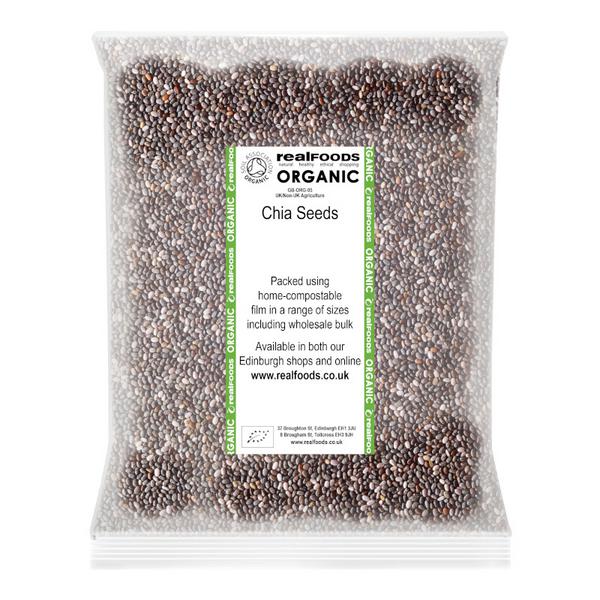
Chia seeds
Stress can increase our levels of anxiety hormones, such as adrenaline and cortisol, and omega-3 essential fatty acids have been shown to help lower inflammation and anxiety. Chia seeds are a great vegetarian and vegan form of omega-3 essential fatty acids. Sprinkle some chia seeds onto your porridge in the morning or use them as an egg-replacer in vegan baking recipes. Other good vegan sources of omega-3 fatty acids include seaweed, algae, hemp seeds and flax seeds.
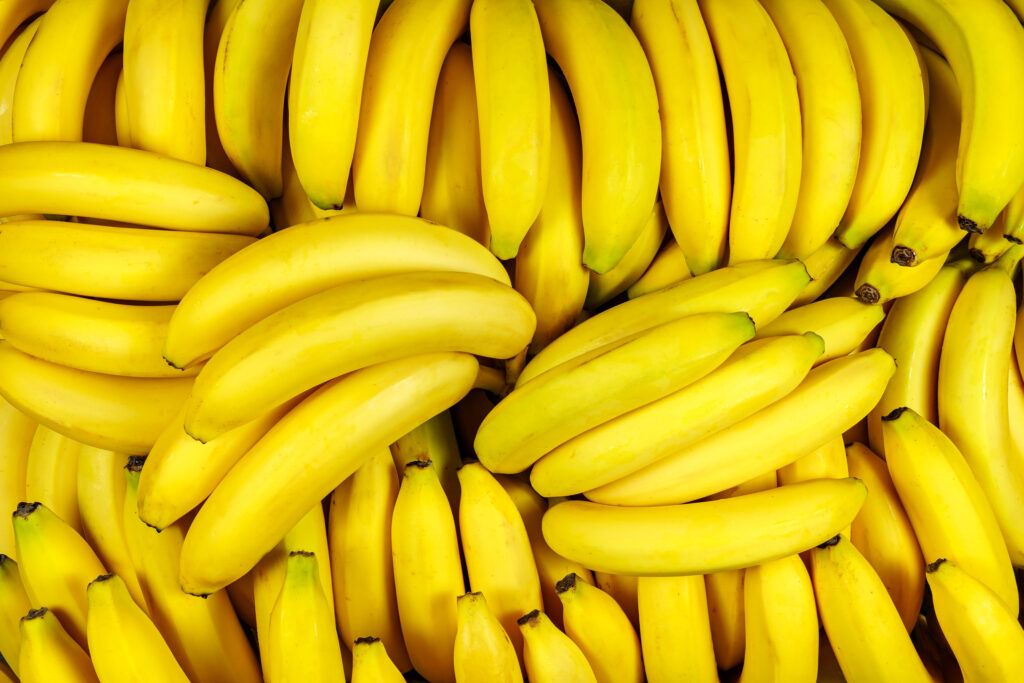
Bananas
Bananas are rich in vitamin B6, which helps with the production of the feelgood hormones dopamine and serotonin. In addition, they have a good fibre content, meaning that the sugar they contain is slowly released into your bloodstream. This helps to balance blood sugar levels and keeps stress and anxiety in check. What’s more, unripe bananas are a good source of prebiotics, which are fibres and natural sugars that aid the growth of good gut bacteria. Up to 90 per cent of the body’s serotonin is produced in the gut, so a healthy gut may help to lead to better mental health. This leads us on to our next point.
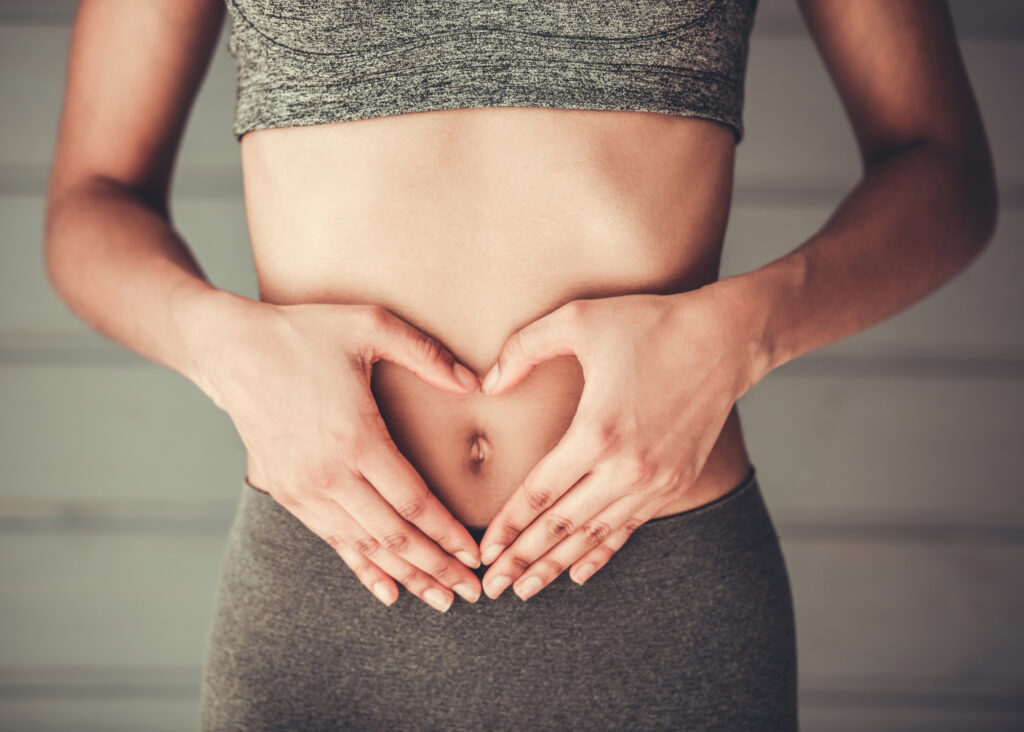
Good gut health = good mental health
An exciting new area of research is called psychobiotics, which examines whether targeted probiotics can support the microbiome and positively influence our mental health. Researchers have discovered that the make-up of our gut bacteria can influence our moods and emotions. So the research is looking at whether certain probiotics, taken through supplements or fermented foods, can help with this.
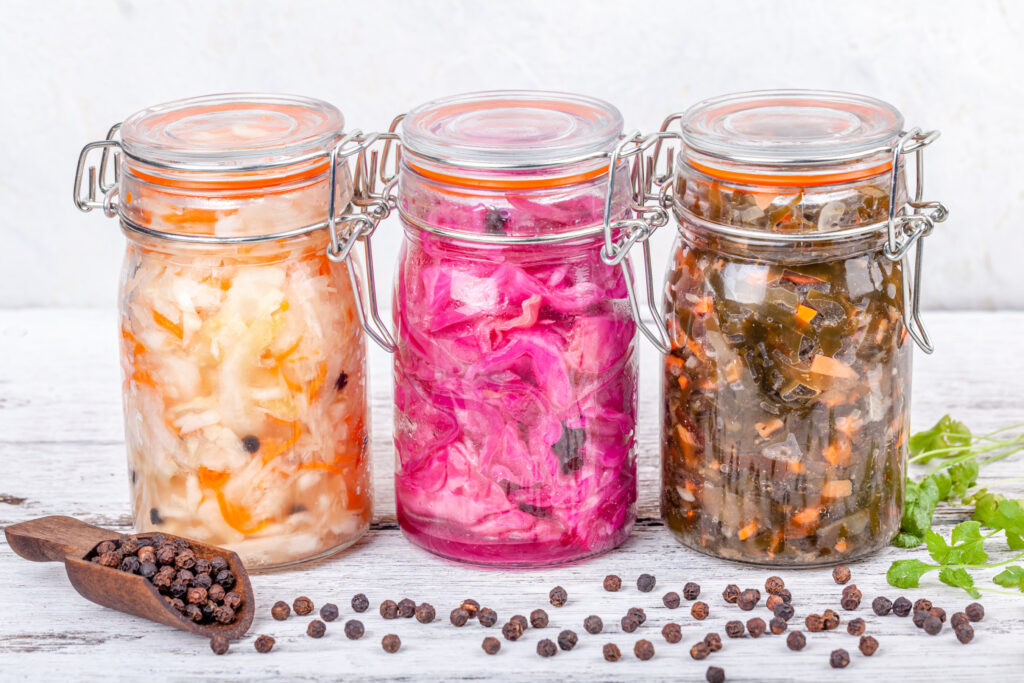
A 2020 study found that prebiotics and probiotics can help to ease the symptoms of anxiety and depression. And this 2021 study showed that taking a specific probiotic strain improved stress and anxiety symptoms. Fermented foods like kimchi, yogurt, kefir, kombucha and sauerkraut are all great sources of probiotics.

Sleep glorious sleep
Good quality sleep is just as crucial for good mental health as a nutritious diet. There is a strong association between sleep and depression, with statistics showing that around three quarters of depressed patients have insomnia symptoms. Around 40 per cent of young depressed adults and 10 per cent of older patients have hypersomnia, or excessive daytime sleepiness. And, when it comes to anxiety, research shows that insufficient sleep can promote anxiety in those who are at high risk of it.
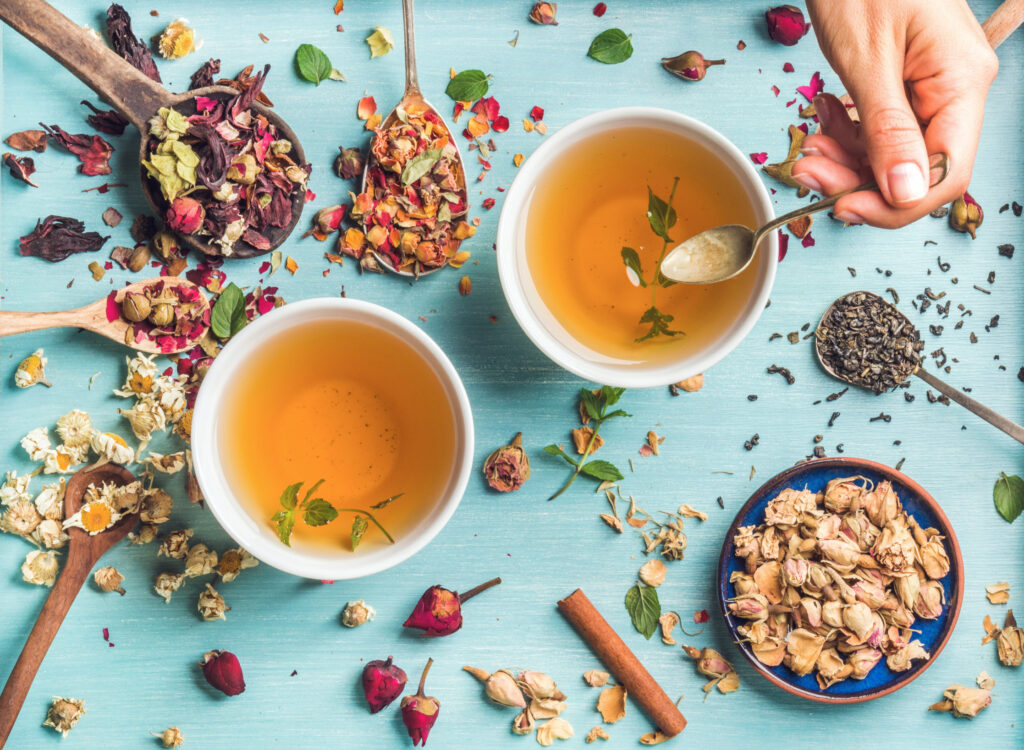
Herbal teas such as chamomile, passionflower or lavender can help the mind to switch off and promote restful sleep. Try drinking a cup an hour before bed as part of your bedtime routine. Other tips for a better night’s sleep include darkening your bedroom as much as possible and keeping it quiet and cool. Ban electronic devices from the bedroom, such as laptops, phones, iPads and TVs as the blue light they emit can make the brain think that it’s daytime. This can disrupt the body’s natural sleep-wake cycle.
So, in conclusion, following a plant-based Mediterranean diet and balancing your blood sugar levels should help to promote better mental health. Add in some superfoods to help lessen the effects of stress and anxiety and you should be on your way to feeling brighter, happier and healthier.







